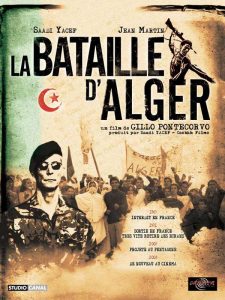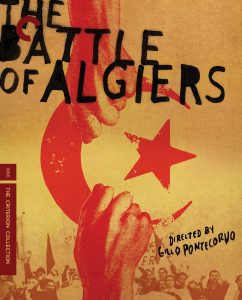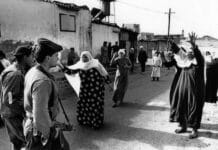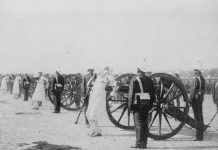Linkbox med materiale om Gillo Pontecorvos filmklassiker ‘Slaget om Algier’ om Algier-krigen 1954-1962.
Musik af den senere spaghettiwestern (m.m.)-komponist Ennio Morricone. Se nekrolog: Ennio Morricone, among the greatest composers for the cinema, is dead at 91. By Marc Wells (World Socialist Web Site, 8 July 2020).
Tidsskriftcentret, marts 2009
Socialistisk Bibliotek, maj 2018
Filmen Slaget om Algier havde dansk premiere 1. september 1967 og repremiere i Cinemateket 5. april 2009. I den anledning denne linkboks med materiale om filmen.
Se filmen online/See full version online::
The Battle of Algiers (English subtitles) (YouTube.com, 2:01:33 hour)

The Battle of Algiers (film) (Wikipedia.org)
Saadi Yacef fought for Algeria’s freedom — then immortalized it on film. By Malia Bouattia (Jacobin, Oktober 5, 2021). “Gillo Pontecorvo’s 1966 film The Battle of Algiers immortalized Algeria’s fight against French colonial rule. But Saadi Yacef, who died last month at age 93, stood out among the movie’s stars, for he had also been a key leader of the armed struggle in real life.”
The Battle of Algiers. By Simon Assaf (Socialist Review, Issue 431, January 2018; online at Internet Archive). “It is a masterpiece of cinema, with a sublime musical score by Ennio Morricone. The dual edition DVD/Blu-ray is great news. The film has been restored and there are lots of extras, including interviews with the director and Saadi Yacef, head of the FLN, who appears in the film.”
“The Battle of Algiers” at 50: From 1960s radicalism to the classrooms of West Point. By Madeleine Dobie (Los Angeles Review of Books, September 25, 2016). “… the film has been acknowledged as an influence on everyone from the Black Panthers and the Red Army Faction to the military juntas of the Southern Cone. It may, however, have had the greatest impact in the United States, where it has appealed both to scholars of colonial and postcolonial history, such as myself, and to members of the military and defense community.”
North Africa’s history of struggle: The Battle of Algiers (Frontline, Vol.2, No.14, March 2011). “Bill Scott looks at a classic of world cinema and what it can tell us about struggles in North Africa.”
Looking back at The Battle of Algiers. By Louis Proyect (The Unrepentant Marxist, 12 August 2005). “The Battle of Algiers is a documentary-like, day-by-day, and even hour-by-hour, chronicle of the siege of the Casbah in 1958, which ended in a bloody rout of the FLN. However, just as was the case with the Tet Offensive of 1968 or the assault on Falluja in 2004, this was a pyrrhic victory.”
A timeless portrait of the anti-colonial struggle in Algeria. By Richard Phillips (World Socialist Web Site, 29 May 2004) + interview with Gillo Pontecorvo: ‘Stay close to reality’ (9 June 2004). “While Pontecorvo’s film only focuses on one aspect of the war – the Battle of Algiers of 1954-57 – it is a remarkable work. Almost 40 years after its initial release it has tremendous resonance because it demonstrates the modus operandi of contemporary colonial oppression and reveals what gives rise to and fuels a nationalist insurrectionary movement.”
Gillo Pontecorvo: ‘My film shows what can happen when people unite’ (Socialist Worker, Issue 1923, October 2004). “Tom Behan spoke to Gillo Pontecorvo about the film and politics.”
Their struggle belongs to the world. By Tom Hickey (Socialist Review, Issue 288, September 2004). “From June 1956 to October 1957 the Algerian liberation struggle was fought in the capital, Algiers. Tom Hickey looks at the history and its representation in The Battle of Algiers.”
What does the Pentagon see in ‘Battle of Algiers’? By Michael T. Kaufman (The New York Times, September 7, 2003; online at Internet Atchive). “Challenged by terrorist tactics and guerrilla warfare in Iraq, the Pentagon recently held a screening of ‘The Battle of Algiers’, the film that in the late 1960’s was required viewing and something of a teaching tool for radicalized Americans and revolutionary wannabes opposing the Vietnam War.”
The big picture: Battle of Algiers. By Martin Smith (Socialist Review, Issue 202, November 1996; online at Internet Archive). “It is a powerful film. The French government banned it until 1971. It was also shown by other national liberation movements the Viet Minh in Vietnam, the IRA in Ireland and the Sandinistas in Nicaragua. Cinematically it has influenced generations of film producers, from Costa Gavras’s Z and Missing to Oliver Stone’s Platoon and Salvador.”
Se også:
- Emneoversigten Film
- Tidslinjen 19. november 1919 om Gillo Pontecorvo.
- Tidslinjen 5. juli 1962 om Algiers uafhængighed.
- Tidslinjen 17 oktober 1961 om Paris-massakren.
- Tidslinjen 1. november 1954 om om uafhængighedskrigens start.
- Tidslinjen 8. maj 1945 om Setif-massakren.
- Personlisten om Frantz Fanon
































